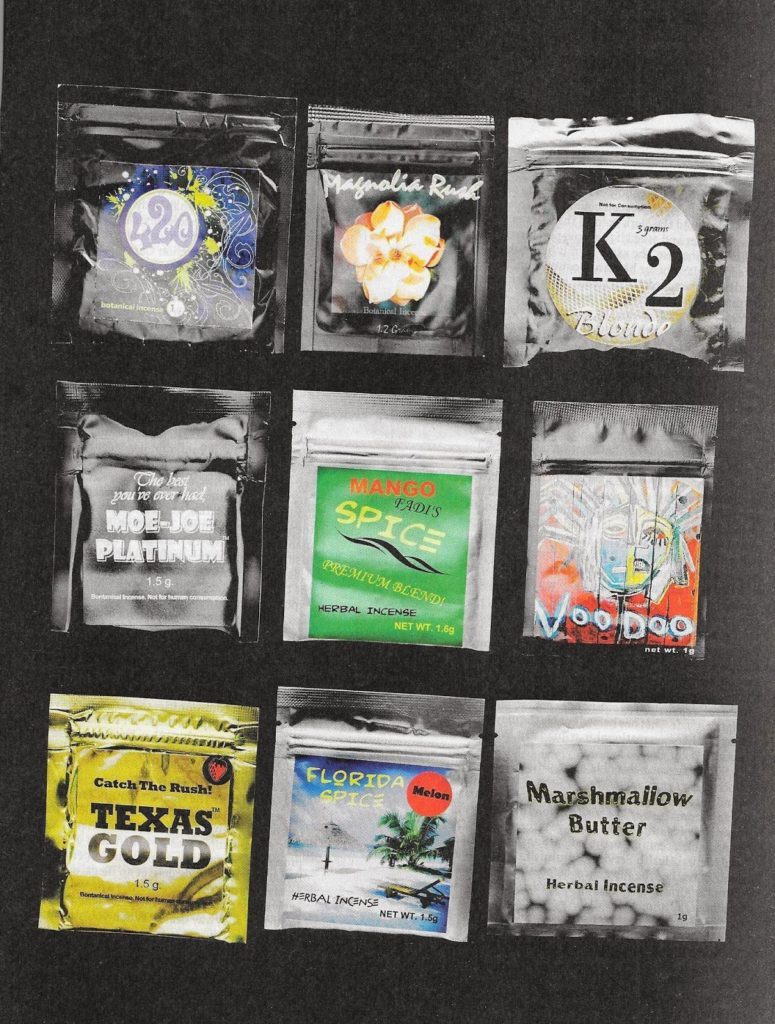 |
| Click to enlarge! |
Heat-Sealed Foil Packets of “Herbal Incense”
Take a few minutes and look closely at the photo to the left. Go ahead, you can click on the photo and enlarge it. The packages have clever names: Magnolia Rush, 420, K2 Blonde, Moe-Joe Platinum, Mango Fadi’s Spice, Voo Doo, Texas Gold, Florida Melon Spice and Marshmallow Butter.
Of the nine packages displayed seven indicate that the contents of the package are either “botanical incense” or “herbal incense.” Three of the packages clearly warn “not for human consumption.”
These heat-sealed foil packets come complete with a bar-code and are sold in gas stations and convenience stores, as well as head shops. But what’s in these packages?
Welcome to the world of fake pot, synthetic marijuana…synthetic cannabinoids
The cover story of TIME Magazine April 21, 2014, is The Rise of Fake Pot and it serves as a quick primer for parents, teenagers, teachers, young adults, and medical professionals. Understand that most of these products are manufactured in Asia.
Herbal incense and Potpourri are among the labels found on synthetic cannabinoids, which act on the same receptor in the brain as THC, the psychoactive ingredient in cannabis–that is, marijuana. They are typically sprayed on an inert, leafy plant (often damiana or marshmallow leaf) that users buy and smoke.
Investigative reporter, Eliza Gray, continues:
Doctors say symptoms caused by these drugs include vomiting, seizures and excessive heart rate. U.S. emergency rooms saw 11,406 visits involving synthetic cannabinoids in 2010, the latest year for which data is available, according to the federal Substance Abuse and Mental Health Services Administration, which had not tracked the substances before that year. That figure is a fraction of the 2.3 million drug-related ER visits overall, though SAMHSA notes that synthetic-related visits may be undercounted because of hospitals’ limited ability to screen for the substances.
Cottonwood Tucson treats those who use synthetic cannabinoids
Spice addiction or abuse of synthetic drugs like synthetic marijuana is best treated in a setting that has a strong psychiatric medicine component. Our psychiatric clinicians are well versed on the effects of synthetic marijuana and are able to manage drug-related psychosis in an appropriate setting. Our psychiatric staff works with other members of our treatment team to help patients whose thought process has been impaired by the use of this drug to regain rationality.
Some final thoughts…
At this point research is still limited. Scientists, law enforcement authorities, the Drug Enforcement Administration (DEA), the Centers for Disease Control (CDC), and the federal Substance Abuse and Mental Health Administration (SAMHSA) are all working diligently to understand the various products and how to eliminate their use. It is vitally important to remember that synthetic marijuana causes mental harm, physical harm and death.
Parents and teachers can assist in this process by being aware. If you see a foil packet that seems suspicious, then take the time to question your child or student. Don’t be taken in or sidetracked by the innocuous label “herbal incense.”
Start the conversation.












